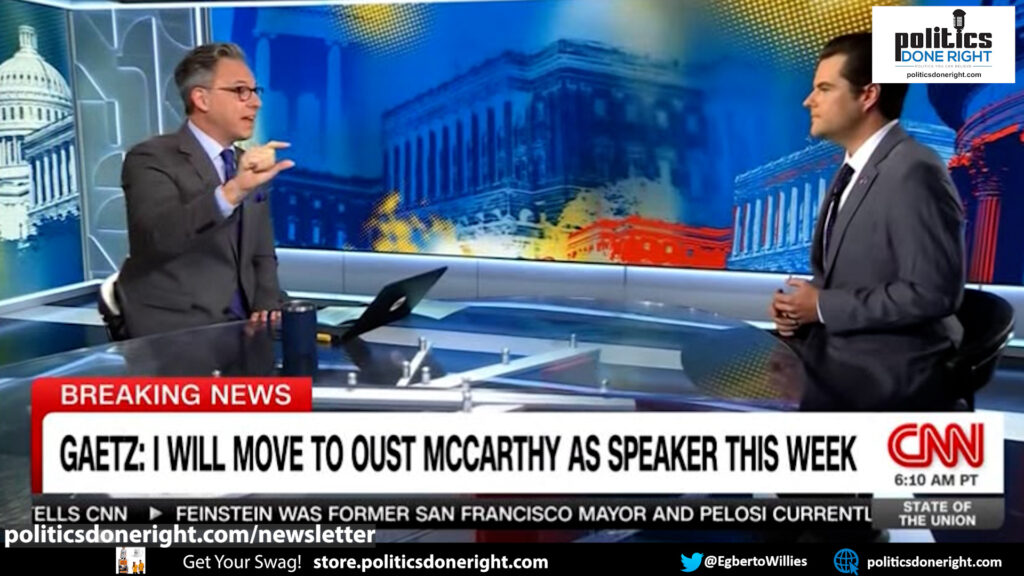CNN Host Jake Tapper took irresponsible MAGA Congressman Matt Gaetz to task for his attempted government shutdown. Tapper called him out for grandstanding for clicks, likes, Fox hits, and his hypocrisy.
Jake Tapper justifiably ridicules Matt Gaetz.
In American politics, media has become a powerful tool for politicians to gain attention, influence opinions, and sometimes deflect from the issues at hand. Jake Tapper‘s recent criticism of Representative Matt Gaetz shows how some political figures may be more inclined to seek media hits rather than contribute constructively to policy discussions. The interaction between Tapper and Gaetz serves as a cautionary tale, warning us of the perils of valuing media spectacle over substantive dialogue.
In this clip:
- During an interview, Jake Tapper criticizes Matt Gaetz, suggesting Gaetz is more focused on garnering media attention than meaningful political action.
- Gaetz intends to call a motion to vacate the Speaker of the House position, hinting that if Kevin McCarthy becomes Speaker, it will be due to Democratic support.
- Tapper challenges Gaetz on his stance on government spending and the national debt, pointing out inconsistencies in his voting history and the policies he supports.
- Gaetz argues for a different system where the House and Senate negotiate independently over government agencies, a point Tapper suggests reveals a lack of understanding of legislative function.
- The segment concludes with a strong critique, suggesting that Gaetz’s quest for media attention could backfire, costing him influence and credibility.
During the interview, Gaetz expressed his intent to call a motion to vacate the Speaker of the House position. He insinuated that if Kevin McCarthy becomes the Speaker, it will only be due to Democratic support. This maneuver appears to be a performative act of rebellion against party leadership, ostensibly to win approval from Gaetz’s voter base. Tapper responded by questioning the sincerity of Gaetz’s political maneuvers. By doing so, Tapper exposed a crucial issue in modern politics: the rise of performative acts that may earn ‘likes’ and ‘clicks’ but do little to advance meaningful policy goals. The lines between political action and spectacle blur in an era where politicians can become influencers.
Tapper went on to question Gaetz’s inconsistencies on fiscal responsibility. The host pointed out that Gaetz had previously voted for continuing resolutions that contributed to the issues of debt and deficit spending, which he now claims to fight against. Tapper’s line of questioning here is not just a “gotcha” moment; it’s a necessary critique aimed at political double standards. Policymakers often rally behind issues such as reducing government spending when it’s convenient or plays well to their base but vote contrary to these supposed convictions when it suits them. This trend is harmful to the democratic process. Voters are misled, and trust in political institutions is eroded further.
Gaetz’s retort to these allegations involved advocating for a system where the House and Senate negotiate independently over each government agency. While this may sound like a reasonable approach to governance, Tapper keenly noted that Gaetz’s arguments reveal a lack of understanding of how legislation works. The balance of power between the House and Senate is delicately maintained through established protocols, and Gaetz’s suggestion shows either a misunderstanding or a willful disregard for these institutional norms.
The segment ended with Tapper summing up Gaetz as someone more concerned with “clicks and likes and Fox hits” than meaningful contributions to governance. This poignant critique encapsulates a growing concern among political observers. The seduction of media attention can lead politicians to prioritize spectacle over substance, risking their credibility and the quality of American governance.
As a society, we must demand more from our elected officials. Media platforms, being the double-edged swords they are, can either uplift or diminish the quality of our political discourse. Tapper’s incisive critique is a valuable lesson in discerning the spectacle from the substance in the ever-theatrical arena of modern politics. Media coverage should strive to hold public figures accountable for their actions, as Tapper has done, rather than simply providing them a platform for self-promotion. Focusing on issues rather than optics can foster a political environment conducive to genuine dialogue and effective governance.
Watch the entire clip. It provides the proper context with narrative.
Viewers are encouraged to subscribe and join the conversation for more insightful commentary and to support progressive messages. Together, we can populate the internet with progressive messages that represent the true aspirations of most Americans.

